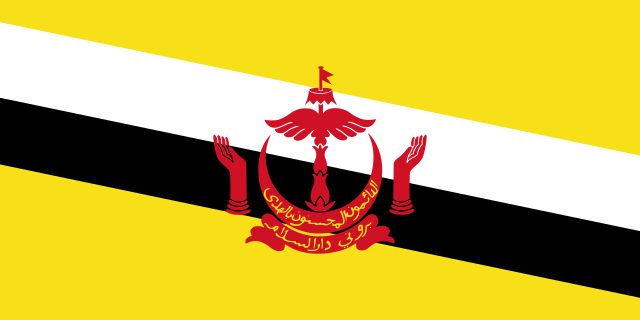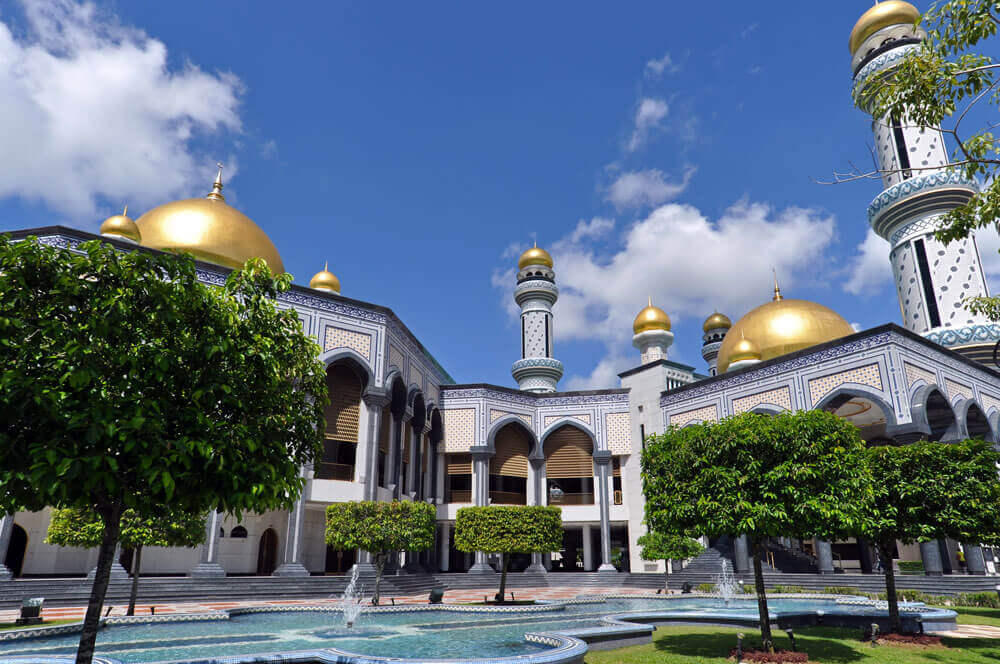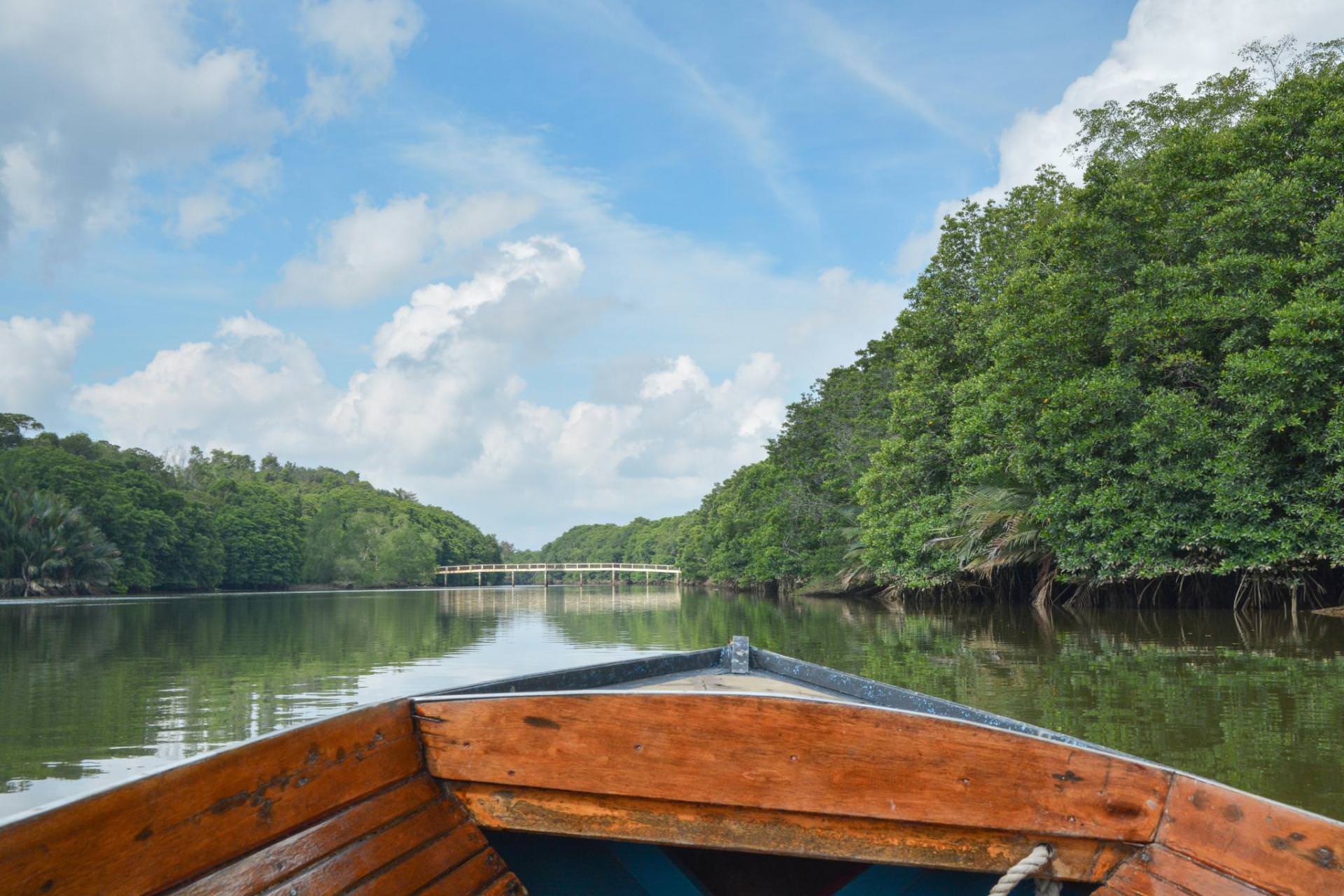Brunei Darussalam

Capital city: Bandar Seri Begawan
Population: 441,532 (2021)
Land area: 5,765 km²
Official language: Malay
Legal system: British common law, with a parallel Syariah law system for Muslims
Time zone: GMT+8
Currency: Brunei Dollar (BND)
GDP: 13.47 billion USD (2019)
Main industries: Petroleum, petroleum refining, liquefied natural gas, construction, agriculture, aquaculture, transportation
Principal exports: Oil and natural gas
The Islamic Sultanate of Brunei Darussalam is a Southeast Asian country located on the northern coast of the island of Borneo, the third largest island across the globe. The country is divided inti two segments as the Eastern state of Serawak of fellow Commonwealth member state, Malaysia, runs in between and encompasses its remaining borders. The capital city of Bandar Seri Begawan is located on the western segment which is comparatively larger.
Brunei is known for beautiful stretches of white quartz sand beaches along its northern coastal plain and its many burnished mosques. Venturing down from the northern coasts, to the east coastal plain rises to mountains, towards the west are hilly lowlands and the southern region consists majorly of rugged and hilly terrain. The highest peak point of the country, known as Pagon Peak, is approximately 6,070 feet tall and is located in the southeastern region of the western segment. This western segment is largely drained by the Belait, Tutong and Brunei rivers whereas its eastern counterpart is drained by the Pandaruan and Temburong Rivers. All of these water bodies flow northwards to the South China Sea. 75% of the country is covered in tropical rainforest which are amongst the oldest in the world and account for 6% of global biodiversity; the government has done well to protect the natural habitat from human interference.

Demographics
The population is estimated to be 478,054 strong as of early 2022, making the country the smallest both in size and population in the Southeast Asian region. The majority of Bruneians, around 65.8%, are ethnically Malay; 10.2% of the population is Chinese while the remaining 24% are made of many diverse ethnicities. Malay is the official language though the Kedayan dialect spoken in Brunei is different from Standard Malay and is spoken by two-thirds of the population. English and Chinese are also commonly used especially in official and business settings. With Islam as the official religion of the country, 80.9% of Bruneians are Muslims, 7.1% are Christian, 7.1% are Buddhist and the remaining 5.0% practice several other religions.
Brunei Darussalam has a youthful population as 40% are below the age of 25 and 47% are of employment age (25-54 years old). The population growth rate is 1.45% and 80% of all Bruneians live in urbanized areas, partially due to which Brunei has the second highest ranking, with fellow Commonwealth state Singapore ranking first, on the Human Development Index for the Southeast Asian region.
History
Archaeological evidence shows signs of the island being inhabited 40,000 years ago by Austronesian immigrants. Both Arabic and Chinese historical records showcase the existence of a kingdom that traded with and paid tribute to the Chinese dynasty as early as 518 CE and was located at the mouth of the Brunei River, referred to as “Po-ni” or “Pu-li” by the Chinese. Soon after the island came under the control of Sumatran Srivijaya Empire, the Buddhist regime in the Indonesian Archipelago, and subsequently in between the 8th and 9th century came under the administration of the Majapahit Empire of Java. Based on evidence found in an excavation site near the capital city of Brunei that the Chinese may have also had some control over the island’s trade in some regions in 835 AD. The island was rich in camphor, spices, precious woods and exotic jungle products for which the empires sought control and trade.
Islam is said to have arrived on the island in 1371 and the Arabic script known as “Jawi” became widespread amongst the people through trade with the merchants from the Arabian Peninsula and India. The influence of the religion became stronger and more officially established when the monarch of Brunei, Sultan Muhammad, allegedly embraced Islam in 1405 and began the rule of the dynasty that remains the oldest and longest reigning till today. The kingdom was known to be at its peak during the 15th and 16th centuries during the reign of the fifth Sultan, Sultan Bolkiah, who expanded his sultanate over Sarawak, Sabah, Borneo and also the Sulu Islands and parts of the Philippines. This attracted many merchants and travellers from European nations including Italy, Spain, and Portugal. The Spanish invaded Brunei twice, once in 1577 and then again in 1578 during which they managed to annex the capital before they were repelled within a year by Sultan Abdu’l Kahar, the sixth Sultan. Soon after, a civil war erupted, lasting for several years consequently discouraging trade and leading to mass emigration. Additionally, Sultan Abdu’l Kahar had to give away a significant fraction of territory to the Sultan of Sulu for his support during the unrest.
Internal tensions and battles continued into the 19th century. The twenty-third Sultan of Brunei, Sultan Omar Ali Saifuddin II, desired full control of the region of Sarawak to crush the uprising led by one of the ruling chiefs of Sarawak, Datu Patinggi Ali, and also to take over the newly discovered antimony mines. The Sultan faced much opposition and quickly realised he could not take control of Sarawak alone; during this time, British adventurer, James Brooke, had arrived from Singapore to personally assess the economic potential of Sarawak and due to his close friendship with the Prime Minister of the region, who also happened to be the uncle of the Sultan, he agreed to assist the Sultan in his conquest, in turn for the guarantee that he would become the Governor of Sarawak. In 1839, the Sultan and James Brooke successfully took control of Sarawak but the camaraderie soon fell apart due to the latter’s demands for greater accessions. The British attacked Brunei Town in 1846 and the Treaty of Labuan was signed, officially giving the island of Labuan to Great Britain. The Sultanate of Brunei continued to decline in power and agency over the decades as the North Borneo Chartered Company continued to annex more and more regions of Brunei. By 1888 the twenty-fifth leader of Brunei, Sultan Hashim Jalilul Alam Aqamaddin, signed the “Treaty of Protection” which officially brought the territory of Brunei under British administration.
Foreign control was viewed with suspicion and distrust but remained stable as the British implemented a residency system in 1906 instead of full-on colonisation, on the advice of Malcolm Stewart Hannibal McArthur, the first British Resident of Brunei. This gave the Sultan the right to supervise internal affairs and the economy of Brunei thrived with the discovery and start of petroleum production in 1926 by Shell which has greatly contributed to the nation’s wealth seen today. Between 1941 and 1945, the territory was taken over by the Japanese during World War II, but as the British regained control, movements for self-governance and independence began to gain momentum and in 1959 negotiations for the terms and conditions of independence began to take place. In the same year, the British resident was replaced by a high commissioner thereby giving the Bruneians more internal agency while the British maintained control over defence and foreign policy. Subsequently, Brunei drafted a written constitution and in 1962 the Legislative Council was established, though with limited decision-making power. Following an uprising that took place in the same year, the constitution was suspended when the Sultan declared a state of emergency. Elections were held once more for the Council in 1965 but appointed members maintained majority. Brunei remained politically and socially stable due to its continued economic success as one of the wealthiest oil-producing nations across the globe. Ultimately, in 1979, the British and the Sultan of Brunei, Haji Hassanal Bolkiah Muʿizzaddin Waddaulah, signed a treaty confirming conditions and agreements for Brunei’s independence in 1984 and both Malaysia and Indonesia vowed to acknowledge the nation’s sovereignty. The Sultan slowly replaced the British civil servants and influences with local ones throughout the decade.
The Islamic Sultanate was proclaimed on 1 January, 1984; the Legislative Council was dissolved and a ministerial form of government as established with the Sultan appointed as the prime minister as well as minister of defence, foreign policy, economic affairs and several other departments of governance. In 2004, the Legislative Council was reintroduced though with an entirely appointed membership. As of 2007, the National Development Party is the sole legal party in the nation.
Key Dates
1521 Spanish navigator Juan Sebastian del Cano reaches Brunei
1841 Sultan of Brunei Omar Ali Saifuddin II makes British army officer James Brooke Governor of Sarawak
1846 Brunei cedes island of Labuan to Britain.
1888 Brunei becomes a British protectorate.
1906 Brunei administered by a British resident, with the sultan overlooking internal affairs
1929 Oil extraction starts
1941-45 Japanese occupation of Brunei
1959 Sultan Omar introduces Brunei’s first written constitution; Islam becomes state religion
1963 Brunei decides to remain a British dependency instead of joining the Federation of Malaysia
1984 Brunei becomes independent
2016 Brunei ratifies the Paris Accord in September

Legal System and Government
In 1959 Brunei became a self-governing state and adopted a constitution, although the British retained jurisdiction over foreign policy, defence, and internal security. Limited attempts at elected representative government under this constitution were abandoned by 1970. After Brunei attained full independence in 1984, an Islamic sultanate was established, and the constitution underwent significant amendment. Ultimate authority rests with the sultan, who is both head of state and head of government. As prime minister, he presides over a Council of Ministers (cabinet) and is advised by several other councils (Religious, Privy, Succession, and Legislative); the members of these bodies are appointed by the sultan. In 2004, the sultan approved a number of amendments to the constitution. Although a provision for a partially elected Legislative Council was among the amendments, elections have not been held.
The legal system of Brunei is based on common law and Syariah (Shari’ah) law for the nation’s Muslims that supersedes the former in family affairs, property law and inheritance. Syariah criminal law applies to both Muslims and non-Muslims as of 1024, making the nation the first Southeast Asian nation to do so. The country’s Supreme Court consists of the High Court and Court of Appeals and the Subordinate Court comprises the Magistrates’ Courts. Along with the Supreme Court, the Syariah Court has also been set up to oversee Islamic law implementation. In 1991, the Intermediate Court was set up to manage civil and criminal jurisdiction though it is not involved in the dealing of capital offences.
Economy
Brunei is an emerging, high-income economy that relies predominantly on its gas and oil reserves which contribute 60% of GDP and over 90% of the nation’s exports, though it only employs 5% of the population, according to 2021 estimates. Brunei’s employment levels in the public sector are the highest across the region with an estimated 50.5% of the population working directly for the government as compared to the 15.4% regional average. Brunei has been making efforts to diversify its economy through agriculture, which as of yet contributes 1.3% to GDP and employs 2% of the population. An estimated 27% of the population is employed in the private services sector including commercial, transport, tourism and financial services. The industry sector employs 21% of the population and contributes 37.6% of GDP, largely through the sectors of petrochemicals, fishing, forestry, construction and manufacturing of aircrafts.
Brunei is a net food-importing country, relying heavily on its regional and global trading partners for 80% of its food requirements. In a bid to increase self-sufficiency and reduce dependence on global oil and gas prices, the government of Brunei released the Brunei Economic Blueprint in early January 2021 as part of the Brunei Vision 2035, providing guidelines and action pathways to develop a sustainable but dynamic and innovative economy. The priority is to reskill the labour force, navigate open trade policies and improve national business environments to attract FDI. Currently, Brunei Darussalam’s score on the Economic Freedom Index is 64.8 making the country’s economy the 9th freest across the region and 62nd freest across the globe.
Trade
Brunei Darussalam’s GDP for 2021 was US$14.01 billion with a trade balance surplus of US$1.85 billion, an almost 250% increase compared to 2020 levels. The nation’s major exports for the year mostly comprised of mineral fuels oils and products of their distillation (78.7%) and organic chemicals (17.8%). The top export destinations for 2021 were Singapore (21.4%), Japan (20.3%), China (20.1%) and Australia (12.5%). For the same year, Brunei’s main imports comprised of mineral fuels, oils and products of their distillation (66.5%), machinery, mechanical appliances, nuclear reactors and boilers (5.5%) and vehicles other than tramway/railway rolling stock (3.1%). These imports were largely procured from Malaysia (22.3%), Russia (15.3%), Saudi Arabia (10.9%) and Singapore (8.7%).
Brunei is a member of the Association of Southeast Asian Nations (ASEAN), the Asia-Pacific Economic Cooperation (APEC), Brunei, Indonesia, Malaysia and the Philippines-East ASEAN Growth Area (BIMP-EAGA), the Multilateral Agreement on the Liberalization of International Air Transportation (MALIAT) and the Regional Comprehensive Economic Partnership (RCEP). The Brunei-Japan Economic Partnership Agreement or (BJEPA) is the nation’s first bilateral agreement; it is also a member of a plurilateral agreement with Chile, New Zealand and Singapore, commonly referred to as the “P4”.
Investment Opportunities
Brunei Darussalam is geographically located in the heart of Southeast Asia with 17 flights to major cities across the region, all of which can be reached within 3 hours by plane. It is connected to all 15 ports of the region and 13 shipping service lines are operational from the country’s Muara Port in the South China Sea. 75% of the nation is of working age, comprising of youthful, tech-savvy and high-skilled labour force fluent in English. The politically and socially stable nation has well-developed infrastructure, world-class education and healthcare systems and good transport connectivity across and between its two sections.
As mentioned, the government of Brunei is looking to diversify its exports and is encouraging foreign investment into 5 major sectors in particular, those being food (more specifically halal food) production, processing and manufacturing; business services focussing on transportation and logistics, financial services and business process outsourcing; the IT sector, particularly data centres, digital media, biotechnology and frontier technology; eco-tourism and hospitality; and, the nation’s already thriving downstream oil and gas and petrochemical industries which the government wishes to further advance.
Through the Brunei Economic Development Board (BEDB) and the Ministries of Finance and Economy, Brunei Darussalam offers many attractive incentives to foreign investors looking to invest in the country. The BEDB has implemented a comprehensive fast-track FDI system which guides investors and provides investment and joint venture proposals which are facilitated and supervised by committees of a minimum of 5 cabinet members that make the final decisions related to any potential investment venture. The nation has 9 industrial parks and 30 designated industrial sites that are readily available for international investors. Apart from infrastructure and dedicated support for foreign investors, the government allows 100% foreign ownership to investors and impose 0% personal income tax, payroll tax, goods and services tax and capital gains tax. The country has an 18.5% corporate tax rate which is the second lowest across southeast Asia; furthermore, Brunei offers a pioneer tax status meaning up to 5+3+3 years of exemption on corporate income tax and import duties.